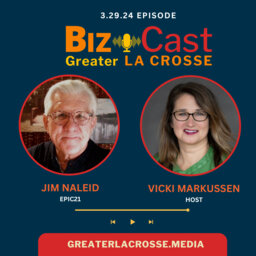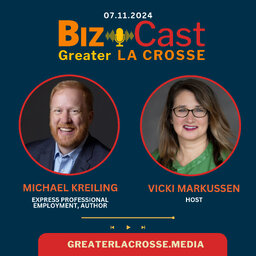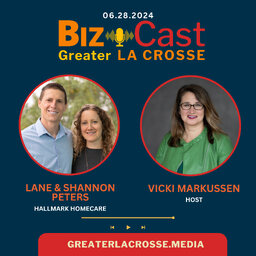
Episode 56
Epic21 Coaches Local Large Business Owners & Gives Back to the Community
About BizCast Greater La Crosse
We bring you news from the business community. From startups to experienced problem solvers, you’ll get in-depth insight on the challenges and opportunities of doing business in Greater La Crosse. Our show is a collaboration between WIZMNews.com and BizNews Greater La Crosse ( GreaterLaCrosse.media ).
Summary
Being vulnerable is opening doors for many of our local, largest business employers with Jim Naleid’s group Epic 21 — which stands for Executive Peers in Conference: 21st Century Leadership. In this episode, Jim talks about his journey from financial advising to a retirement career coaching this group of leaders. The group has championed Junior Achievement and now brings speakers in for the greater community. Learn more and do some self-reflecting on your journey — how you are growing, and what you need to focus on leading, as you listen to this episode.
NOTE: The podcast references a Junior Achievement event. The Correct date is May 2.
Full Transcript [generated by AI]
h and in 2011 is when I really got engaged with what was then Tech Midwest and the executive peer group that I lead today.
[00:03:57] Vicki Markussen: Yeah, so let’s talk about that. It’s no longer called Tech 21, but let’s start with the fundamentals.
[00:04:02] Jim Naleid: What is it? An executive peer group is for business owners and leaders of any stripe. These typically are business owners with companies of at least 5 million in annual revenues and 25 employees was that criteria, sometimes loosely held.
[00:04:18] Jim Naleid: But some of those companies in the group today go from I think The lowest revenue company there now is probably eight or nine million and up to a couple hundred million. And so those companies are all either locally owned or led by local CEOs. And the peer group concept is to create a confidential and safe space for executive leaders to be able to share, to learn pardon the expression, spill their guts and have a place where they know that they can be understood.
[00:04:49] Jim Naleid: So when they’re in that group with 15 other individuals with similar challenges, there’s a great deal of comfort in knowing I’m not alone. And that’s where the power of executive peer groups comes from. But it has to be based upon trust and confidentiality. and really a sense of knowing I can be who I am in a group that will understand what I’m thinking.
[00:05:15] Jim Naleid: You
[00:05:15] Vicki Markussen: can be vulnerable. You can show you don’t know it all. You can pick other people’s brains versus showing up at work feeling like you have to know it all. You’re
[00:05:23] Jim Naleid: absolutely right. And vulnerability is one of the criteria that we help people appreciate that this is a must. You have to be willing to be vulnerable.
[00:05:33] Jim Naleid: Otherwise, you’re not going to get anything out of this experience. And so that, that’s something that’s not easy for business leaders to come to, but when they arrive there, they grow significantly from where they were.
[00:05:45] Vicki Markussen: You may or may not want to give specifics, but what are some examples of how you have seen that group use each other and grow?
[00:05:52] Jim Naleid: I think a couple of things that come to mind, we’ve had several members over the years sell their businesses or make that transition succession planning. That wouldn’t have been able to do it as efficiently if they didn’t have the support of their other group members. And so I think that’s one, one significant way.
[00:06:11] Jim Naleid: I think the other thing that has been noticeably true going back now for more than a decade is the emphasis needed on what really is your core value? What are. Your cultural qualities that make up your company that are real. And helping these leaders not only define and understand what their culture ought to be rather than what they think it is.
[00:06:36] Jim Naleid: And getting to the raw truth of it’s not quite what you’re saying. And so we gotta figure out what needs to be done to make that real.
[00:06:44] Vicki Markussen: And I know in some of the businesses, just because I know some of them in there, there’s also family dynamics, so I’m guessing that is a safe place as well with other people that are working with family members because that is, you’re partners and yet, someone has to lead, and so I’m guessing that’s another outlet for some of those owners.
[00:07:04] Jim Naleid: You’re absolutely right. And in fact, when I think about it, I would guess. 80 percent of the companies in the group are probably family or connected to family in one way or another. Where that’s really true, whether there’s siblings that are involved in the business or relatives or in laws, it goes across the whole spectrum.
[00:07:23] Jim Naleid: So you’re absolutely right, that can be a very delicate dance to conduct and work leaders through.
[00:07:30] Vicki Markussen: And I know that that group … do they still partner with Junior Achievement for fundraising? Yes. I’m glad you brought that up. Yeah, of course. So how did that come about, and what does that support look like?
[00:07:42] Jim Naleid: It was very interesting. Actually, the first offsite retreat we conducted in the group, which was then Tech. We did out at the well, it doesn’t matter where, but we were sitting around the campfire that first evening and most there had the experience so far of what we bring into the group and the thought process is what can we share, give back to the community and how can we do that to hope, hopefully develop future leaders?
[00:08:10] Jim Naleid: And the idea was born from there, and the organization that just came to mind was Junior Achievement. And so we made a commitment at that time to bring in a resource, a speaker, that the entire business community could benefit from, and at the same time support Junior Achievement. And that’s where it started, and it continues today. In fact, May 3rd I think it is of this year, is the next event. [NOTE: The event is May 2]
[00:08:34] Jim Naleid: And I believe the venue is going to be at the Union at the UWL once more. And we’ve got a great speaker from Canada coming in. His name is Eddie Lemoine. And I think it’s going to be another very enjoyable and learning experience for those that attend, besides supporting a great organization that Junior Achievement is.
[00:08:53] Vicki Markussen: Yeah and Junior Achievement makes perfect sense when I saw the very first fundraiser saying, well, of course, this is a business leaders group that is supporting individuals volunteering to go into schools and teach business principals. My son was just at one last week. And so yeah, it’s starting them at a young age to just understand businesses.
[00:09:13] Jim Naleid: and many of the members of Epic 21 have employees that do that volunteering, so it really works out well and it’s a cause among so many, let’s face it, there are many that need support, but it’s just one that fit with our prerogatives.
[00:09:31] Vicki Markussen: Yeah, and so we skipped an important point, which is it’s no longer called Tech 21. Right. What was the progression of the group?
[00:09:38] Jim Naleid: At the end of 2017 at that time a California company had acquired Tech and we decided as a group that we would like to chart our own course. And The beginning of 2018 is when we renamed our group Epic 21, which stands for Executive Peers in Conference 21st Century leadership.
[00:10:03] Jim Naleid: And from there we’ve built that brand, we’ve built that recognition all around this, the similar concept that this is an executive peer group where business leaders really find their footing. Find their voice and come to understand what it means to really lead organizations.
[00:10:20] Jim Naleid: Perhaps some of the things that they weren’t sure of before.
[00:10:23] Vicki Markussen: And you’ve had some very dedicated members of that group, so they obviously must be seeing some great benefit. Are they going out and recruiting others because it’s just that remarkable? No, but
[00:10:34] Jim Naleid: that’s an interesting question. The group has always depended upon existing members.
[00:10:40] Jim Naleid: Filling empty seats. So when a business was sold, or whatever transition the leader was going through that led him to exit from the group, it was really left up to the existing members to identify who they thought might be appropriate to exit. New members to take up an empty chair. We’ve capped that at sixteen chairs just because that’s a norm that works well for a couple of different reasons but it’s not, it’s, it really isn’t left up to me as the chair and the leader of the group to fill empty seats.
[00:11:11] Jim Naleid: I’m involved in the process Once it begins, but basically, everyone that’s in the group today has been identified by one of the existing members.
[00:11:19] Vicki Markussen: So we were talking earlier about gifts, strengths, whatever you want to call it based off of assessments that are done. You are leading a group every month and then meeting with them independently.
[00:11:32] Vicki Markussen: And they’re all leaders. What’s the challenge in doing that?
[00:11:38] Jim Naleid: That’s a good question. And I don’t know, I think the challenge for me is probably to be curious and vulnerable from my own perspective, but my real objective is not to solve their problems. It might be to help them identify the challenges that they need to face.
[00:12:03] Jim Naleid: And if they were to ask me to answer a question for them, my typical response to them is, What would it be if you knew? And so the real idea is not for me to be that person, but I can cajole them to a place where they will lean on each other to, to solve the problems that they’re faced with.
[00:12:23] Vicki Markussen: And just to keep the conversation going, right? So it’s okay, have you explored this or anybody else have ideas? I’m guessing you’re pulling other people into the conversation. Attempting
[00:12:34] Jim Naleid: to. Yeah. And sometimes I can. Light the spark, so to speak. But they take over . They come to have a great deal of appreciation for each other.
[00:12:43] Jim Naleid: And the conversations can be very robust. Around any certain topic. And when a member has a real challenge or an issue that he wants to vet with the group. The group does tremendous work in helping them find some direction or some footing or some affirmation as to the approach that they’re taking.
[00:13:04] Jim Naleid: And so it’s a very valuable experience for them.
[00:13:07] Vicki Markussen: Fantastic. And I wish you the best with that. The upcoming session that is happening on April 3rd, is that tied in with this group or is this a separate endeavor that you’re doing?
[00:13:17] Jim Naleid: No, it started, it started with the group. We first had Severin Sorensen, who is the phenom that is coming in, I brought to our group.
[00:13:25] Jim Naleid: back in August. And so he worked with the executives in the group with artificial intelligence and what was happening there, generative AI, chat, GPT and that was just scratching the surface. But it was such a powerful experience for the members that several said, we ought to bring him back and open this up to others besides just us.
[00:13:44] Jim Naleid: It’s that valuable. And so that’s what we did in September. So there were about 40 that attended that workshop, and then we did it again in November, and again there were 35 to 40 at that workshop. And the obvious became true that this is good stuff, it’s valuable stuff. Everybody today is still talking about it and trying to figure out how to use it, what the dangers are, how to be ethical, and so on and so forth in the use of it.
[00:14:10] Jim Naleid: And Severance coming back on April 3rd. The sessions are going to be at the Festival Foods Training Center. They’re out on Emerald Road. But the morning session is for those that I will say uninitiated are only dabbling and just getting a feel for it, but want to learn more.
[00:14:27] Jim Naleid: And then the afternoon session is for those that are a little bit more advanced, where case studies can really be worked on, but it’s a very interactive, both sessions are very interactive. And it’s just that Severin Sorenson is so proficient in the way he teaches and what he does that those that participate just almost go away overwhelmed.
[00:14:49] Jim Naleid: And it can be a little bit like a water hose, but it’s powerful stuff. So
[00:14:54] Vicki Markussen: go ahead. No, that’s okay. So you have two sessions. Yes. And is there a break in between? Can people attend both?
[00:15:01] Jim Naleid: They can attend both. Actually, the morning session is from 8 a. m. till noon. And we’re breaking for a half hour to get our footing again, and the next session will start at 12:30.And that’ll go till 4:30 because Severin has to catch a flight to get back to where he’s going. Otherwise, we’ll try to do it a little later. But just because of the compression of time, we’ve got two four-hour sessions. And yes, the four-hour session in the morning, it’s all on, you can find all the information on the EPIC 21 website.
[00:15:35] Jim Naleid: So it’s www.EPIC21.biz/events. And there you can see all three options, the morning session, the afternoon session, or both, and a description of them. And there are still seats remaining. We have to limit the seating because of space, not because of any other reason, but the maximum capacity and learning environment stops at about a number 50.
[00:16:02] Jim Naleid: And that facility accommodates it very well. So yes, April 3rd for those that have been hesitant or don’t know whether or not the investment of participating in the workshops is worth it. I think if you talk to anyone that had been to one of the previous ones, they’d, I’d certainly, reassure you that, yeah, it’s a great educational opportunity.
[00:16:21] Vicki Markussen: And so this, he’s been here three times. Yes. Obviously, to high reviews, what are people taking away from it?
[00:16:29] Jim Naleid: I can tell you that many of the people that I’ve had follow-up conversations with are using the different various forms of artificial intelligence. to operate their businesses or to compliment what they’re doing.
[00:16:42] Jim Naleid: I don’t know of, I don’t know of anyone, not that I’ve talked to all participants, that went away and didn’t do anything with it. I think it, a couple of things, overcome the fear learn how to get the most out of that conversation with, Artificial intelligence and how to really lay things out in a way that makes sense.
[00:17:01] Jim Naleid: A lot of people use it, just for grammarly type of things and writing and so on and so forth, but it has so much more power than that. I think people, once they realize that they don’t have to be afraid of it, but understand how it works and how to get the most out of it, is where they really start getting some traction.
[00:17:18] Jim Naleid: And that’s what I’ve seen.
[00:17:21] Vicki Markussen: Fantastic. And kudos to EPIC 21 for bringing a speaker like that. And then that actually segues into another question, which is, you’re not just leading the members of EPIC 21, you’re bringing speakers in for them as well?
[00:17:35] Jim Naleid: well? We do that about four times a year. We bring a third-party resource in and it can be on any topic.
[00:17:43] Jim Naleid: Back in February, we had a specialist come in that dealt with health and proper physical attention. We’ve got a speaker coming in actually next week or. That’s actually on April 4th. So we spaced them out, but we typically have about four speakers come in. But I would tell you that of the components of this peer group experience, they have their one to one sessions with me they have the monthly sessions with the group, and some of those sessions have a speaker.
[00:18:16] Jim Naleid: And I think it would be fair to say that the most significant experience they have is when they’re together as a group. They certainly can learn some things from my discussions and my individual attention given to them, but it’s when they come together where the real dynamics explode, and you can see it happening.
[00:18:36] Jim Naleid: And feel it. It’s almost what’s the right word?
[00:18:38] Vicki Markussen: Energizing? Yeah, palpable. Yeah. Yeah. Yeah. And you’re the person who brings them together.
[00:18:45] Jim Naleid: Yeah.
[00:18:49] Jim Naleid: Well, I, I do. I coordinate, and I facilitate, and I do a lot of arranging. They do the heavy lifting. I, like I said to you, I think in our earlier conversation, I can light a spark and get a batch going, but they’re the ones that really take it and go somewhere with it.
[00:19:04] Vicki Markussen: Yeah. There’s a lot of collective experience and brainpower in that group.
[00:19:09] Vicki Markussen: Absolutely.
[00:19:10] Jim Naleid: There’s absolutely no doubt about that. And
[00:19:11] Vicki Markussen: they’re doing great things between the April 3rd event and the May 3rd event. When will information be out on the May 3rd event? It’s out now.
[00:19:19] Jim Naleid: And I think I’m sorry I don’t have that website, but if they go to the Junior Achievement website, JE.
[00:19:25] Jim Naleid: com I think it’s there, and I’ll be publishing more on, on our website, which is epic21.biz, but It’s out there, and it’s ready for people to begin to make their decision as to whether they’re going to attend or not. Excellent.
[00:19:40] Vicki Markussen: My common closer question. What makes you passionate about what you do?
[00:19:47] Jim Naleid: I love that question. And I think it’s consistent. What makes me passionate about what I do, and you and I talked about this a little bit from the working genius perspective, is My working genius is galvanizing. And enabling. And what that really means is that I enjoy, I get a lot of energy out of bringing this group together.
[00:20:12] Jim Naleid: The enablement part of me is my supporting of them individually. And so for me, it’s a very rich privilege to be able to be in a place where I can interact with these very smart, intelligent people who have great challenges and risk. And perhaps what I do brings some calm. To their life and their experience, while we talk about all these leadership issues and emotional intelligence and all those other things, the exciting thing about what I do and keeps me going is knowing that’s where I can be.
[00:20:42] Vicki Markussen: And they obviously recognize it because they keep coming back. So kudos to you. And
[00:20:47] Jim Naleid: I’m thankful for that.
[00:20:50] Vicki Markussen: Jim Naleid with Naleid and Associates. We have been talking about some things for you to remember. April 3rd is a upcoming two session day. You can choose to attend one, or you can do two. And that’s happening at the Festival Foods Training Center, which is out in Onalaska.
[00:21:08] Vicki Markussen: You can find information on that at epic21. biz forward slash events. And then mark your calendar for May 3rd, which is a fundraiser for Junior Achievement with a great speaker coming in to UW La Crosse. You have been listening to BizCast, Greater La Crosse. I’m your host, Vicki Markussen. We’ll catch you next week.




